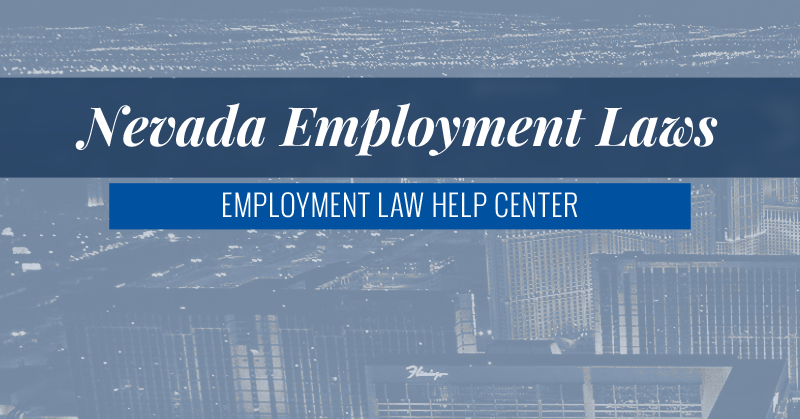Nevada Employment Law Help Center
There are federal and state laws in place in Nevada that protect the rights of employees at work, including laws that prohibit discrimination in the workplace, set the standard for minimum wage requirements, require payment of overtime wages, and govern the right of employees to take time off work. These labor laws apply to every aspect of the employment relationship, including hiring, wages, promotions, benefits, discipline and termination, and offer civil remedies for employees whose rights have been violated. If you believe you have been the victim of a labor law violation in Nevada, contact a knowledgeable employment law attorney today to discuss your options for legal recourse.

Wage and Hour Laws
Nevada wage and hour laws were created to protect the rights of nonexempt employees in terms of minimum wage requirements and paid meal and rest breaks, among other wage and hour concerns. Although some states have a minimum wage requirement that is higher than the federal requirement, Nevada’s minimum wage is the same as the federal requirement, $7.25, for employees whose employers provide health benefits, although state law requires employers who don’t provide health benefits to pay their employees a minimum wage of $8.25 an hour. Nevada wage and hour laws also require employers to provide employees with paid meal breaks and rest periods.
Unpaid Wages and Overtime
The state of Nevada follows federal law when it comes to overtime wages, and the Fair Labor Standards Act (FLSA) requires employers in Nevada to pay nonexempt employees an overtime rate of one-and-one-half-times their regular rate of pay for any hours worked over 40 in a given workweek, and any hours worked over eight in a given workday. Nevada employees who are owed back pay may have grounds to file an unpaid wages claim against the employer to recover the wages they are due.
Employment Discrimination
As in other states, anti-discrimination laws in Nevada prohibit employers from discriminating against employees or job applicants on the basis of a protected characteristic, which in Nevada, includes: race, sex, religion, color, age, genetic information, national origin, disability, sexual orientation, and gender identity or expression. Unlawful workplace discrimination involves an employer making an employment decision that has a disproportionate adverse impact on members of a protected class, such as women and people of certain ancestries or national origins.
Wrongful Termination
Under Nevada wrongful termination laws, it is illegal for an employer to fire an employee for discriminatory reasons that violate state or federal “protected characteristic” statutes, an employment contract or public policy. In Nevada, an employee’s discharge from employment may be considered wrongful if it: violates a written, oral or implied employment contract; is in retaliation for an employee exercising his rights as a whistleblower; or is based on the employee’s membership in a protected class.
COBRA Continuation Coverage
Employees in Nevada who lose their employer-sponsored health plan due to job loss, reduced hours at work, or another qualifying event, may be entitled to COBRA continuation coverage, which allows them to extend their group health insurance for a limited period of time, up to 18 months. Federal COBRA coverage only applies to employers with 20 or more employees, but Nevada has a state continuation program similar to COBRA that applies to employers with between two and 19 employees.
SSI/SSDI Disability Benefits
Disabled individuals in Nevada who are unable to work and earn an income may be eligible for benefits through the federal Supplemental Security Income (SSI) or Social Security Disability Insurance (SSDI) programs. While SSDI benefits are only available to disabled individuals who have worked long enough and paid Social Security taxes, SSI benefits are paid to disabled individuals who are unable to work and have low income and resources, regardless of their work history. The state of Nevada also pays an optional state supplement to all recipients of SSI benefits who are elderly or blind.
To learn more about Federal US employment laws, browse the following topics:





